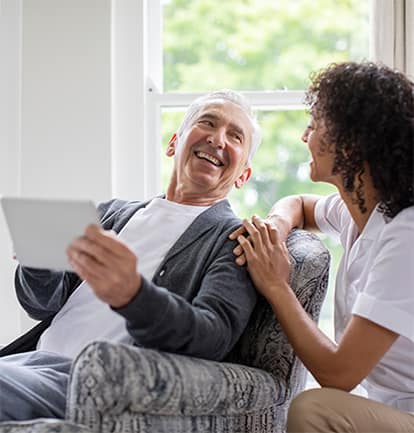
June 26, 2024
As summer approaches, the allure of sunny days draws us outdoors to enjoy the warm weather. However, for older adults, sun safety is important to consider to prevent serious health issues such as skin cancer, heat exhaustion, and dehydration. Here are some essential sun safety tips to help older adults stay safe while enjoying the sunshine.
The skin becomes more delicate and vulnerable to damage as we age. According to the Centers for Disease Control and Prevention (CDC), older adults are at higher risk for skin cancer because of accumulated sun exposure over their lifetime. Implementing effective sun protection strategies is essential to prevent these risks.
Whenever possible, staying in the shade, especially during peak sun hours between 10 a.m. and 4 p.m., can significantly reduce UV exposure. Planning outdoor activities for early morning or late afternoon can also help minimize direct sun exposure.
Wearing protective clothing is one of the simplest yet most effective ways to shield your skin from harmful UV rays. Opt for long-sleeved shirts, long pants, and wide-brimmed hats that cover your face, neck, and ears. Lightweight, tightly woven fabrics provide the best protection without causing overheating.
Applying sunscreen is essential for uncovered skin. Choose a broad-spectrum sunscreen with an SPF of at least 30. Apply it generously to all exposed skin, including often-missed areas like your ears, neck, tops of your feet, and the back of your hands. Reapply every two hours, or more frequently if swimming or sweating.
Protect your eyes from UV rays by wearing sunglasses that block 100% of UVA and UVB rays. This can help prevent cataracts and other eye damage linked to prolonged sun exposure. Wrap-around styles offer the best protection by blocking light from the sides.
Dehydration can occur quickly in hot weather, especially for older adults. Drinking plenty of water throughout the day helps maintain hydration levels. Avoid drinks with alcohol or caffeine as they can contribute to dehydration.
Taking regular breaks indoors or in shaded areas can help prevent overheating and reduce the risk of heat-related illnesses. Use air conditioning or fans to keep cool. Pay attention to how your body feels and move indoors if you start to feel overheated or dizzy.
Some medications can increase sensitivity to sunlight or affect the body's ability to regulate temperature. Consult with your healthcare provider to understand any potential side effects and adjust your sun protection routine accordingly.
Regularly check your skin for any new or changing spots, moles, or blemishes. Early detection of skin changes can lead to prompt treatment and better outcomes. Schedule annual skin checks with a dermatologist for a professional evaluation.
If you care for an older adult, educating them about the importance of sun protection and assisting them in adopting these practices can make a significant difference. Open communication about their comfort and well-being during outdoor activities is vital.
Sun safety is essential for older adults to enjoy the outdoors without compromising their health. By seeking shade, wearing protective clothing, applying sunscreen, and staying hydrated, older adults can protect themselves from the harmful effects of the sun. Regular skin checks and open communication about sun safety can further enhance protection and ensure a safe, enjoyable summer.